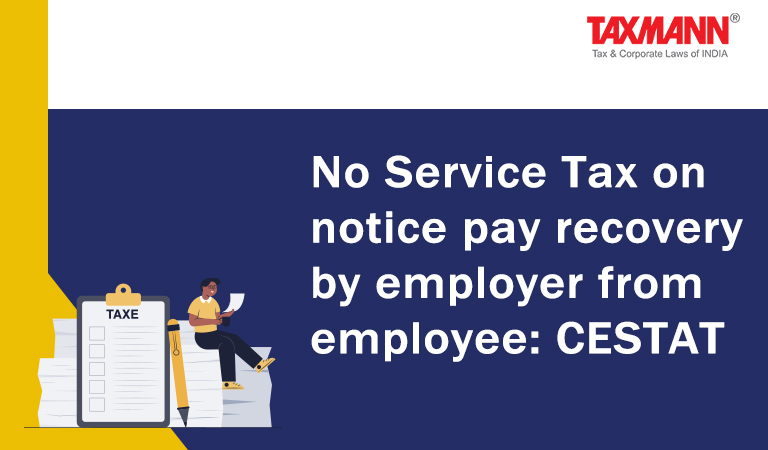No Service Tax on notice pay recovery by employer from employee: CESTAT
- News|Blog|GST & Customs|
- 2 Min Read
- By Taxmann
- |
- Last Updated on 4 February, 2022

Case Details: Rajasthan Rajya Vidhyut Prasaran Nigam Ltd. v. Commissioner of Central Goods and Services Tax, Customs and Central Excise, Jodhpur - [2022] 135 taxmann.com 6 (New Delhi - CESTAT)
Judiciary and Counsel Details
-
- Dilip Gupta, President and P.V. Subba Rao, Technical Member
- Narandra Singhvi and Ms. Priyamvadi Joshi, Advs. for the Appellant.
- Nanendra Yadav, AR for the Respondent.
Facts of the Case
The appellant was a public sector undertaking of the Government of Rajasthan and engaged in transmission of electricity. Its records were audited by the Service Tax Department and it was found that the appellant has not discharged service tax on amount recovered from its employees on their premature resignation, i.e., without giving the requisite notice period. The demand was confirmed and the Commissioner (Appeals) upheld the order in original. Hence, the appellant filed this appeal.
CESTAT Held
The Honorable CESTAT observed that notice period and compensation are incorporated in employment contract but they are not the purpose of contract. A notice period on both sides is provided for so that the other party can make arrangements. Compensation is a fall back option if one of the parties frustrates the contract but compensation paid for failure to fulfill conditions under a contract is not consideration for service under the contract. In the instant case, notice pay did not give rise to rendition of service either by employer or employee. Following the law laid down by Madras High Court in GE T&D India Ltd. v. Dy. CCE [2020] 119 taxmann.com 55, it was held that service tax not exigible on amount received by employer from employee for not serving notice period.
Case Review
-
- GE T&D India Ltd., v. Dy. CCE [2020] 119 taxmann.com 55 (Mad.) (paras 17 and 19) followed.
List of Cases Referred to
-
- Commission of Service Tax v. Repco Home Finance Ltd. [2020] 117 taxmann.com 755 (Chennai – LB) (para 14)
- South Eastern Coalfields Ltd. v. CCE & ST [ST Appeal No. 50567 of 2019, dated 22-12-2020] (para 14)
- MNH Shakti Ltd. v. Commission of Central Goods & Services Tax & Central Excise [2021] 132 taxmann.com 115 (Kol. – CESTAT) (para 14)
- Ruchi Soya Industres Ltd. v. CC, CG & ST & CE [2021] 129 taxmann.com 368 (New Delhi – CESTAT), (para 14)
- GE T&D India Ltd. v. Dy. CCE [2020] 119 taxmann.com 55 (Mad.) (para 17)
- CST v. Intas Pharmaceuticals [ST Appeal No. 12436 of 2008-DB, dated 25-6-2021] (para 17)
- State Street Syntel Services (P.) Ltd. v. Commissioners of CGST [ST Appeal No. 8975 of 2018, dated 25-11-2020] (para 17)
- Shri Ram Pistons and Rings Ltd. v. CCT [2021] 126 taxmann.com 183 (All. – CESTAT) (para 17)
Disclaimer: The content/information published on the website is only for general information of the user and shall not be construed as legal advice. While the Taxmann has exercised reasonable efforts to ensure the veracity of information/content published, Taxmann shall be under no liability in any manner whatsoever for incorrect information, if any.

Taxmann Publications has a dedicated in-house Research & Editorial Team. This team consists of a team of Chartered Accountants, Company Secretaries, and Lawyers. This team works under the guidance and supervision of editor-in-chief Mr Rakesh Bhargava.
The Research and Editorial Team is responsible for developing reliable and accurate content for the readers. The team follows the six-sigma approach to achieve the benchmark of zero error in its publications and research platforms. The team ensures that the following publication guidelines are thoroughly followed while developing the content:
- The statutory material is obtained only from the authorized and reliable sources
- All the latest developments in the judicial and legislative fields are covered
- Prepare the analytical write-ups on current, controversial, and important issues to help the readers to understand the concept and its implications
- Every content published by Taxmann is complete, accurate and lucid
- All evidence-based statements are supported with proper reference to Section, Circular No., Notification No. or citations
- The golden rules of grammar, style and consistency are thoroughly followed
- Font and size that’s easy to read and remain consistent across all imprint and digital publications are applied



 CA | CS | CMA
CA | CS | CMA
